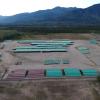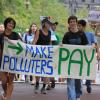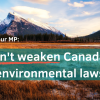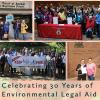From December 16-18, 2019 the Federal Court of Appeal panel of judges, composed of Chief Justice Marc Noël with Justices Denis Pelletier and John B. Laskin, heard oral arguments on the latest round of appeals of the approval of the Trans Mountain pipeline and tanker project (TMX).
Environmental Law Alert Blog
Through our Environmental Law Alert blog, West Coast keeps you up to date on the latest developments and issues in environmental law. This includes:
- proposed changes to the law that will weaken, or strengthen, environmental protection;
- stories and situations where existing environmental laws are failing to protect the environment; and
- emerging legal strategies that could be used to protect our environment.
If you have an environmental story that we should hear about, please e-mail Andrew Gage. We welcome your comments on any of the posts to this blog – but please keep in mind our policies on comments.
The BC government is developing a “climate preparedness and adaptation strategy to help ensure that communities across BC can prepare for a changing climate.” Now the government wants to hear from you about how climate change is af
Ever since Trudeau bought the Trans Mountain pipeline from Kinder Morgan, taxpayers have been on the hook for its multi-billion dollar construction price.
The public thinks the fossil fuel industry should be paying for climate costs.
That’s the conclusion of a number of polls that have been released over the past couple of years in countries around the world.
The ocean is taking centre stage in the international law world.
In June 2019, Canadians celebrated the passing of a series of important federal environmental laws – including the Impact Assessment Act and Canadian Energy Regulator Act (Bill C-69) and the Oil Tanker Moratorium Act (Bill C-48).
When concerned individuals, community groups and First Nations are seeking justice on behalf of the environment, they need someone to turn to.
The excitement and anticipation from the public viewing gallery at BC’s legislature was palpable.
It was called “Canada’s climate election,” and as the dust settles we can celebrate that 63% of votes cast were in favour of parties that made strong










